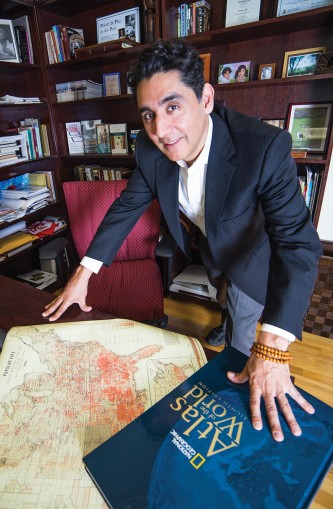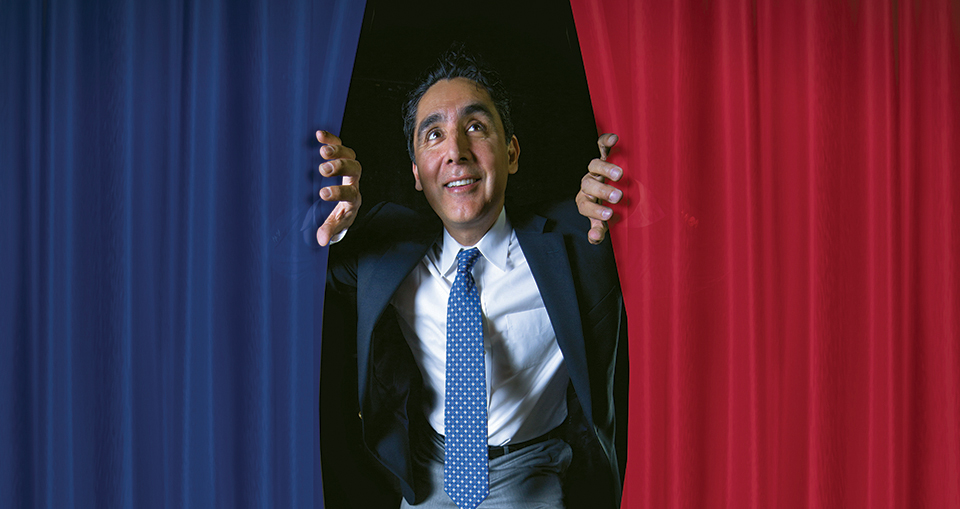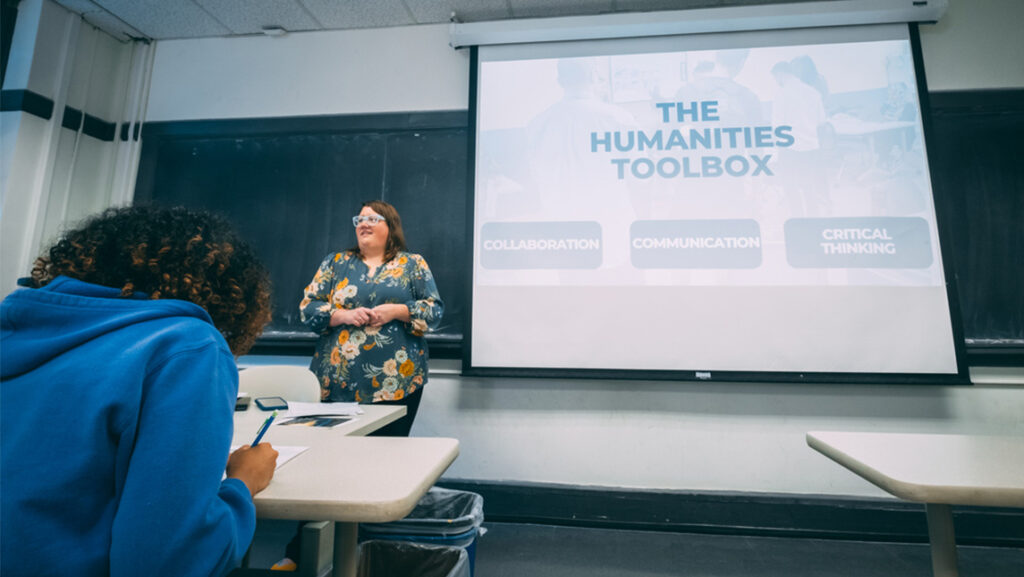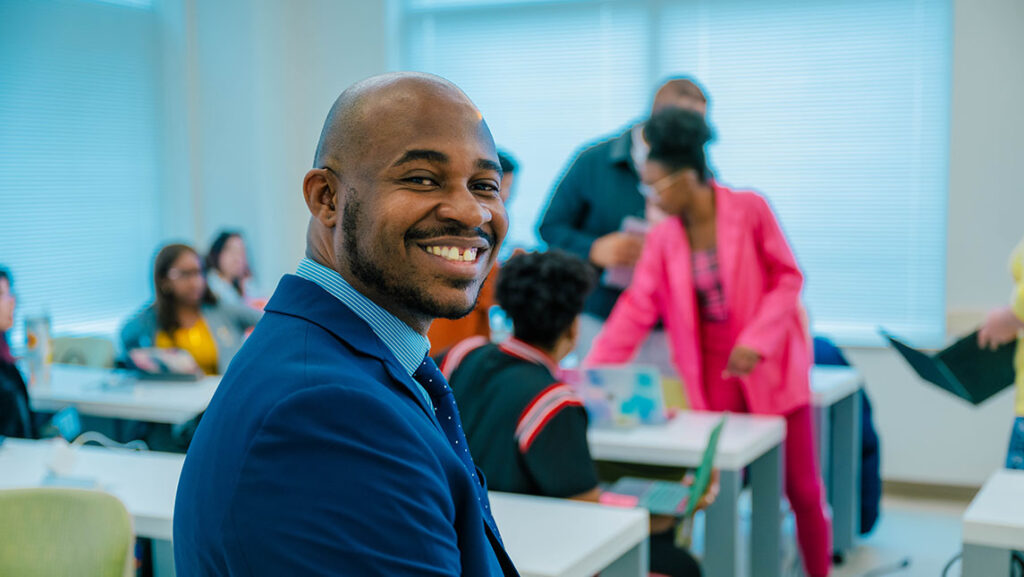Redacted from “The independent voter,” spring 2016 UNCG Research Magazine
It’s independents’ day. This year’s presidential contest illustrates the growing power of independent voters and their growing dissatisfaction with America’s two-party political system. UNCG Professor Omar Ali, the 2016 Carnegie Foundation North Carolina Professor of the Year, studies and advocates for the inclusion of independent voters in the political process.
“In the polling data, most voters have a mix of views on issues. More and more people say, for instance, ‘I’m fiscally conservative and socially liberal.’ They’re mixing it up,” Dr. Omar Ali says. “I think that’s more accurate in life. People are not all one thing or another.”
Ali comes to that view naturally. He isn’t “all one thing or another.”
His father is East Indian Muslim; his mother, Peruvian Catholic. He spent much of his youth living and traveling in different countries around the world, as his family followed his father’s job to North Africa and the Middle East. Visits to Ali’s mother’s family took them to Latin America. He went to high school in California and later did research in Ghana, Colombia, Ethiopia, and India.
“Being put into many different situations, I have some appreciation for nuance,” he says. “In some ways, I culturally identify as Christian and Muslim, but then again I also identify with many other traditions.”
“When I started learning about politics, it seemed silly, I believed, for people to be so fixed in this one camp or the other, this partisan mentality,” he says. “I can appreciate that you’re into a sports team, but your sports team doesn’t decide major social policy.”
Ali’s interests in African Diaspora history and in independent voters are linked. His studies of contemporary independents are an extension of his work as a historian. His first book, “In the Balance of Power: Independent Black Politics and Third Party Movements in the U.S.” (Ohio University Press, 2008), focuses on the history of independent African-American politics in the United States.
Ali’s knowledge of that history gives him a different perspective on independent politics.
Concern for process

Rather than share common ideologies or political sentiments, Ali says independents share a concern about process.
According to pollsters, 43 percent of Americans self-identify as independents.
“There is an emerging, organized movement of independents in America,” Ali says. “That’s the thing I am particularly interested in because it’s a basic issue of inclusion, of democracy.”
But it’s a movement that faces obstacles created by the two major parties. In many states — including North Carolina — it is nearly impossible to get on the ballot as an independent candidate. To run for governor, the Democratic and Republican candidates just have to win their party nominations — no matter how few citizens vote in the primaries.
An independent candidate faces a much steeper challenge.
“You have to get over 100,000 voter signatures to have your name just appear on the ballot, while the Democrats and Republicans have written the rules so they don’t have to gather any. Their nominee gets on automatically,” Ali notes. “Most people don’t know that there’s such a structural legal bias. In the law, independents are second-class citizens.”
Ali notes that independent candidates who have gained support have generally been people who were already public figures — such as ex-professional wrestler Jesse Ventura, who served as governor of Minnesota — or very wealthy — like Ross Perot, the successful businessman who ran as an independent candidate for president in 1992 and garnered 20 million votes.
Independent candidates who successfully win an election — like Ventura — are still few and far between. However, Ali believes that the support outside candidates have won in this year’s presidential primaries reflects a growing anti-partyism.
“What we’re seeing is an expression of Americans wanting to move away from parties altogether,” he says. “There is a strong perception that the parties are more concerned about themselves than ordinary citizens. That’s the thing that I am particularly interested in. It’s an issue of democracy, of participation.”
Ali serves on the board of IndependentVoting.org, a national strategy and leadership training center for progressive, post-partisan electoral reform.
Of the 43 percent of Americans who identify as independents, many remain registered as Democrats or Republicans. The reason? If they registered as independent, Ali says, they would have no voice in the primaries that effectively determine the outcome of most elections.
In a few places, though, independents have gained more influence over election outcomes, changing the culture of partisanship.
California’s ‘Quiet Revolution’
In 2010, California adopted an open primary system for all elections except the presidential race. Ali and Jason Olson, the president of San Francisco-based Independentvoice.org, studied the impact of California’s move to open primaries.
Their 2015 report, “A Quiet Revolution: The Early Success of California’s Top Two Nonpartisan Primary,” found big changes had occurred.
In the new system, an open primary is held — citizens can vote for whomever they choose, without concern for party. The top two vote earners then compete in the general election.
California politics have changed dramatically as a result. Among the study’s key findings:
More competitive elections. From 2000 to 2009 just two incumbent candidates in state legislature and congressional elections were unseated (both were under criminal investigation). Since 2010, California elections have become the most competitive in the country.
Less polarization. California’s state legislature, long known for missed budget deadlines and deadlock, operates better. Budgets are balanced and lawmakers have been more willing to collaborate with colleagues across the aisle.
And, of course, independent voters can now vote in primaries, giving millions of people a more meaningful political voice. “Those who make the rules, rule.” Ali says. “That’s the meat and potatoes of politics.”
California isn’t the only state with a nonpartisan primary system. Washington and Nebraska have similar systems, and there are proposals in several other states to adopt top-two primary systems. (Not in North Carolina.)
Engaging young voters
Independent voters like open primaries. And young voters are much more likely to be independent.
Ali and four of his students conducted a study in 2012, meeting several thousand students at 16 North Carolina colleges — public universities (including UNCG), private universities, and community colleges. The polling was done face-to-face.
The research team found that three-quarters of the students they stopped identified themselves as independents — regardless of how they were registered for voting purposes. The team then asked 1,246 of the self-identified independents 21 follow-up questions.
They found that nearly two-thirds identified themselves as “antiparty” and that 94.3 percent agreed that independent voters should be allowed to vote in primaries.
Though that research focused on young voters, Ali points out that even among older voters — including those 65 or older — there is a large contingent who identify as independents.
This growing support for nonpartisan politics, for more power for all voters and less for the parties, for changing political structure and process, strikes Ali as fundamentally American.
“We forget that the American Revolution was actually all about process,” he says. “It wasn’t ‘No taxation,’ it was ‘No taxation without representation.’ It’s about representation. It’s about process.”




